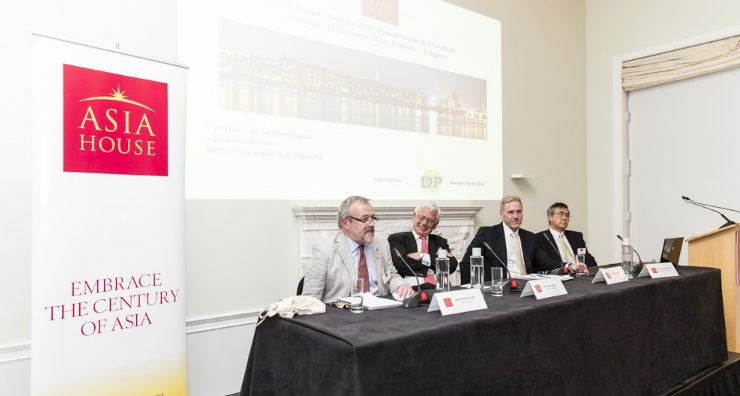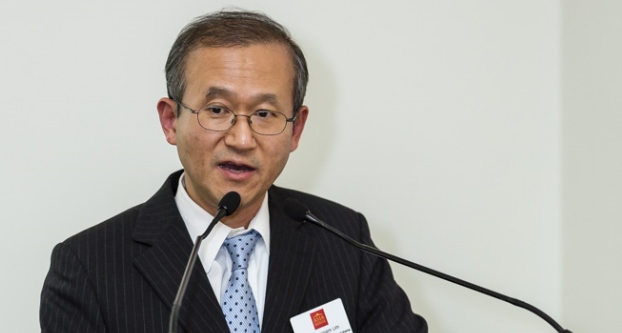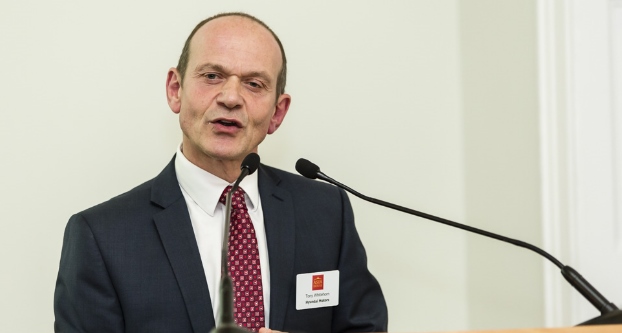Driving commercial and political engagement between Asia, the Middle East and Europe
Driving commercial and political engagement between Asia, the Middle East and Europe
Driving commercial and political engagement between Asia, the Middle East and Europe

High household debt, powerful trade unions, an ageing population, reliance on exports, and the dominance of chaebols are among the challenges facing Asia’s fourth largest economy.
South Korea has seen its economy soar from a state of poverty and recipient of aid handouts in the 1960s to a powerhouse donor within four decades. It was one of the first Asian countries to bounce back from the 2008 global financial meltdown and now has a high-tech globalised economy which boasts some of the world’s most iconic brand names from Hyundai to Samsung. But despite being the 15th largest economy in the world, it faces challenges well beyond its tensions with North Korea. These were among the topics discussed at the conference South Korea: An Economic Powerhouse in Transition, held at Asia House, in partnership with Master Key to Asia, on 21 October 2014.
The Ambassador of the Republic of Korea to the UK, HE Sungnam Lim, spoke about the flourishing bilateral ties between South Korea and the UK. Twenty-four MOUs were signed during President Pak Geun-hye’s State Visit to the UK a year ago, and the two nations agreed to double bilateral trade and investment by 2020, he said. Trade between Korea and the UK is expected to be worth $14 billion by the end of 2014 and the two countries were working together in various ways, for example, a South Korean ship evacuated 47 British nationals from Libya in August. A new Korean War Memorial dedicated to the British servicemen and women who served in the 1950-1953 Korean War, will be unveiled in London in December.

HE Sungnam Lim, Ambassador of the Republic of Korea made the opening remarks at the South Korea: An Economic Powerhouse in Transition conference. Photo by Miles Willis
Of the 16 countries which participated in the Korean War (when US-led UN troops fought with South Korea against Communist-backed North Korea), the UK was the only one that to date did not have a memorial in its capital even though 82,000 British servicemen fought and 1,000 died, the Ambassador said. The costs of the memorial have been met by “generous contributions” from the Korean and British business community, including from Standard Chartered Bank and the Embassy of the Republic of Korea in London, Mr Lim said.
He then spoke about how the South Korean Government was addressing the challenges the country faced. “Many foreign investors feel that household debt is a major risk for the Korean economy. Economic commentators have spoken about quantitative easing, the appreciation of the yen and a China slowdown,” he said.
But he said Korea’s three to four per cent annual GDP growth, the low unemployment rate of 3.5 per cent, 1.4 per cent annual inflation, government debt at 34 per cent of GDP, a current account surplus of more than $7 billion and with more than $350 of foreign reserves in the Treasury, the Republic of Korea was in a strong position to tackle all this. He said the Government planned to reduce the ‘household debt-to-disposable-income ratio’ by five per cent by 2017 and the central bank had recently cut interest rates to 2.00 per cent. He added the Government was tackling the ageing population problem by trying to increase employment of women and young people by offering better childcare and flexible work time patterns.
South Korea is benefitting from FTAs with the EU and USA, and is negotiating one with China. Zero tariffs on importing cars have also greatly benefitted European car manufacturers exporting to South Korea, he pointed out. He said the Korean Government recognised the need to enhance its domestic demand to achieve more balanced growth and was nurturing various industries including tourism, healthcare, finance, software as well as fostering business environments that SMEs could prosper in. The Government also aimed to raise spending on research and development to five per cent of GDP, he said. “Asia House is making unique contributions in bringing the UK and Asia closer,” he added.
Tony Whitehorn, President and CEO Hyundai Motor UK Limited, then gave a talk about the largest automobile manufacturer in South Korea and fastest growing car manufacturer in the world. He began by explaining that Hyundai was a chaebol or huge family-owned conglomerate split into Hyundai Motor Group, Hyundai Department Store, Hyundai Development and Hyundai Heavy Industries. The Hyundai Motor Group had 86 companies and had jumped from being the 13th largest automobile manufacturer in the world in 1997 to being predicted as the fourth largest in 2014. He spoke about how Hyundai had taken advantage of being a latecomer to the car manufacturing sector by opening up plants across the world, including in China, India, Russia and Turkey, and it had 100 per cent utilisation of its factories, unlike other car manufacturers, which started earlier, such as European manufacturers which had much older plants.

Tony Whitehorn, President and CEO Hyundai Motor Limited, was the keynote speaker at the conference. Photo by Miles Willis
He pointed out Renault’s most recent factory was built in 1979, whereas Hyundai’s first factory was built in 1974 and its most recent plant was built in Brazil in 2012.
Hyundai was doing better in emerging markets than developed ones, he admitted. It has a 40 per cent market share in Korea and is among the top five automobile manufacturers in the top emerging economies in the world. But it has only a three per cent share in the UK and a five per cent share in the US. “We have struggled to get a market share in evolved markets,” Mr Whitehorn said. But Hyundai thrived in the tough times and had grown 193 per cent since 2007/2008 when total car sales across the world fell, he added. “The major reason for people picking us in 2009 was price. Today it’s style,” he said.
One of the secrets to Hyundai’s success were that it came to market very quickly, unlike for example Japanese manufacturers that spend much longer in planning, Mr Whitehorn explained. “This means at the point of implementation it’s very stressful because we may not be ready so you have to adapt and meet customer needs as quickly as possible,” he said.
There was a Korean proverb, ‘Go-saeng Ggeut-eh naki eun-da’ (고생 끝에 낙이 온), which means ‘At the end of hardship comes happiness,’ which inspired South Koreans to work hard and pushed Hyundai to want to penetrate Europe even though Europe was “the most complicated market and most difficult to penetrate,” he added.
However, he conceded the strength of the trade unions in South Korea was a huge problem. “The strength of the unions in South Korea is significant and we do suffer from strikes,” he said, but he explained that 94 per cent of the cars sold in the UK come from Europe “so we are not reliant on Korea,” he added. As for the fact Hyundai was run by a family dynasty, he pointed out that that itself offered longevity and continuity. “The son, Chung Eui-sun, currently vice chairman of Hyundai Motor Company, is not exactly going to leave and join Nissan. He is steeped in the company, so Hyundai has a very good stable future because there is a very strong family at the head of the organisation,” he said.
In response to a question from the audience, he said that, in his view, electric cars were not the future, rather cars powered by hydrogen fuel cell were. Hyundai has just produced the world’s first mass-produced fuel cell car, the ix35 FCEV.
However, Sir Thomas Harris, Vice Chairman at Standard Chartered, and former British Ambassador to South Korea, was very disillusioned with the banking sector in South Korea. “One of the ways the Korean Government has been reducing debt has been by empowering debtors to go to their banks and demand write-offs or rescheduling of their debts which might make the debtors happy but it does not make the banks happy. It’s a massive headache for the Korean banking industry,” he said.
“Korea has the lowest proportion of bank revenues generated by non interest in Asia and a much tighter supervision of products than anything we have faced,” he said. He added Standard Chartered had found it very difficult to introduce performance-related compensation schemes and had experienced very serious strikes, including one that lasted nine weeks “that were unknown in his industry.”
He described South Korea’s labour laws as “antiquated” and said returns on equity were lower than the cost of capital and the “Korean banking industry was destroying itself.” “In Korea our job is seen as to lend to Hyundai. We are not seen as profit-making growth sectors in our own right. HSBC has closed down and Aviva has withdrawn. We have announced a billion-dollar write-down in our investment in Korea and closed 73 branches,” he said, adding Korea needed to move from being an economy dominated by a dozen chaebols to a mixed economy with SMEs and start-ups.
But he conceded that “South Korea was the most exciting place in the world for technology. We use it as a test bed for new forms of online banking before we roll it out elsewhere in Asia.”
To see a slideshow of the conference click below:-
Photos by Miles Willis
naomi.canton@asiahouse.co.uk
Click here to read David Clive Price’s recent article Insights into how to do business in South Korea.
